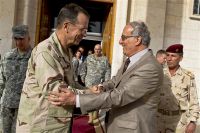BAGHDAD, July 27, 2010 — The United States military is committed over the long-term to a positive, productive partnership with Iraqi security forces, the chairman of the Joint Chiefs of Staff said here today.
The U.S. military drawdown in Iraq is on schedule, said Navy Adm. Mike Mullen. The drawdown, he added, will reduce the numbers of U.S. troops in Iraq to less than 50,000 by August 31.
“I see absolutely nothing to negatively impact that [drawdown],” Mullen said during a joint news conference with Jacob Lew, deputy secretary of state for management and budget. Mullen has been visiting Iraq since 2004. “I’ve seen things at their worst,” he recalled. “I remember when very few people had very few hopes for a better future in Iraq. Today, that hope abounds. It’s nearly palpable.”
Mullen said he is stunned and pleased by the changes in Iraq, but more progress must be made. The U.S.-Iraqi relationship will move from mainly military to one based on “strong, vibrant civilian institutions and leadership,” the admiral said.
There are just under 65,000 American servicemembers in Iraq today – down more than 100,000 from the height of the surge of forces in 2007. Mullen praised Army Gen. Raymond T. Odierno, the commander of U.S. Forces Iraq, and his team for their management of the drawdown.
American planners here said they have sent much-needed equipment to U.S. troops in Afghanistan, provided equipment and materiel to Iraqi security forces, and cleaned up many of the sites to U.S. environmental standards.
The U.S. mission will change from Operation Iraqi Freedom to Operation New Dawn on September 1, and the American forces will switch totally to an advise and assist role, Mullen said. U.S. forces, he added, will retain the ability to defend themselves.
Other U.S. forces will continue to train and work with the Iraqi army and Iraqi police, Mullen said. Other troops will continue to help the Iraqis develop logistics capabilities for their security forces, and also develop the Iraqi air force and navy.
“We will continue to assist in targeted counterterrorism operations where necessary,” the chairman said. “But it is the Iraqi security forces that must provide for the security of their own people.”
Mullen believes the Iraqi security apparatus is ready, and said he is pleased with their performance. Violent acts have declined 50 percent since July of last year, Mullen said, and security incidents are at their lowest point since 2003.
What’s more, the Iraqi security force’s behavior during the recent national elections proved to the Iraq people that the military is apolitical and loyal to the Iraqi constitution. “As I have said to my own military, there are few attributes more important or more vital to a democracy than a military that stays out of politics and remains subservient to civilian leadership,” Mullen said.
The election left a closely divided legislature, and the Iraqi politicians have yet to form a new government. Senior U.S. officials, including Vice President Joe Biden, have told the Iraqis that it is important for them to work together to form a government as quickly as possible. However, the delay in forming the new Iraqi government will not affect the U.S. drawdown or many of the development programs already underway, Mullen and Lew said.
Yet, the weakened insurgents still retain the ability to launch attacks, Mullen said. He called yesterday’s attack on the headquarters of al Arabiyah television network an attempt to muzzle the press.
“That these criminals chose to lash out at a responsible, free and independent media organization, speaks volumes about the desperation of their situation and their motives,” Mullen said. Insurgent attempts to squelch the Iraqi press, the admiral said, represents “nothing more than an attempt to hold back the Iraqi people from the free exchange of ideas and greater awareness of the world around them. It is as futile as it is foolish.”
The chairman met today with Iraqi President Jalal Talibani, Prime Minister Nouri al-Maliki and former Prime Minister Ayad Allawi. Mullen also met with Defense Minister Abdul Qadir and Gen. Babakir Zabari, the Iraqi military chief of staff.
Source:
U.S. Department of Defense
Office of the Assistant Secretary of Defense (Public Affairs)

 von
von 
